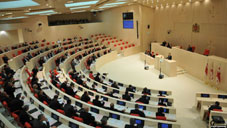
118 NGOs Call on Parliament to Support Draft Law on Gender Quotas
By Tea Mariamidze
Friday, March 9
118 Non-Governmental organizations (NGOs) based in Georgia call on the parliament to support draft law on gender quotas, which envisages equal political representation between women and men.
Civil society organizations urge the Parliament to support legislative initiative backed by 37,455 signatures. The statement was made by the representatives of the NGOs at the old building of the parliament on March 8, when the international day of women is celebrated.
The NGOs assure the draft law provides a historic opportunity for Parliament to help increase women’s political participation.
“We are pleased that during committee-level discussions the draft law was supported by the legal affairs, human rights protection and regional development committees. It is imperative that the authorities and opposition parties demonstrate a clear political will for equality between women and men and support the legislative initiative of Georgian citizens,” the statement, released by the NGOs, reads.
The legislative initiative was submitted to the Parliament of Georgia on June 12, 2017. It introduces mandatory requirement for parties and blocs to prepare gender balanced lists for elections where every other candidate is of a different sex, and replace any elected member who abandons his/her mandate with the next successful candidate on the party list who is of the same sex.
“The proposed model is a temporary special measure to correct gender imbalance. If approved, share of women in the 2020 Parliament will be at least 26%,” the NGOs said.
The organizations explain that women account for 52.3% of Georgian population, while their representation in elected offices is disproportionately low. In the last parliamentary elections women were able to secure only 16% of seats in the legislature and they account for 13.46% of elected members of City Councils.
“With such figures Georgia is lagging far behind developed countries in terms of women’s political representation. Despite the slight increase in the number women in elective office over the recent years, at current pace it will take decades to correct the gender imbalance in legislative and local self-government bodies,” the non-governmental sector stressed.
According to the polls, majority of Georgian population believes that number of women in Parliament and in self-governing bodies is very low and support mandatory gender quotas, as evidenced by over 37,000 signatures.
“Meaningful measures should be taken to overcome the existing barriers. Gender quotas in proportional election lists is a temporary legislative measure to ensure equal participation of women and men in politics,” the NGOs assure.
The organizations remind that under the amendments made to the Constitution in 2017, Georgia committed itself to ensuring elimination of inequality between men and women and achieving substantive equality, including by taking special measures.
They added the obligation to ensure gender equality is established by many international agreements, including the Convention on the Elimination of All Forms of Discrimination against Women (CEDAW) and updated EU-Georgia Association Agenda, which contain new obligations for Georgia, including the obligation to take active steps towards increasing women’s representation in political life and decision-making process.


